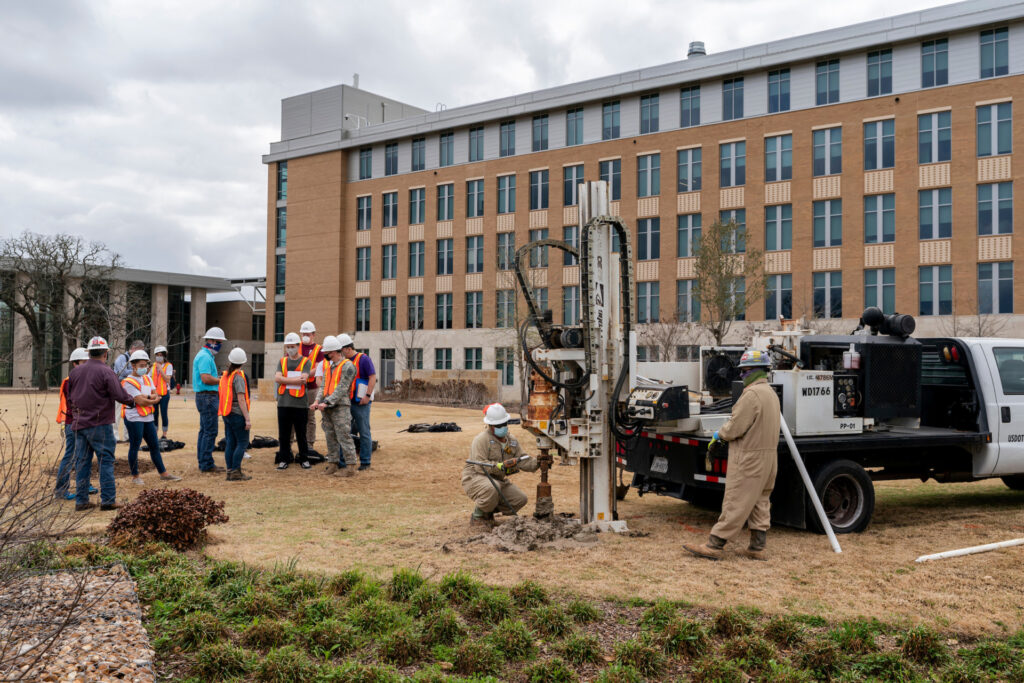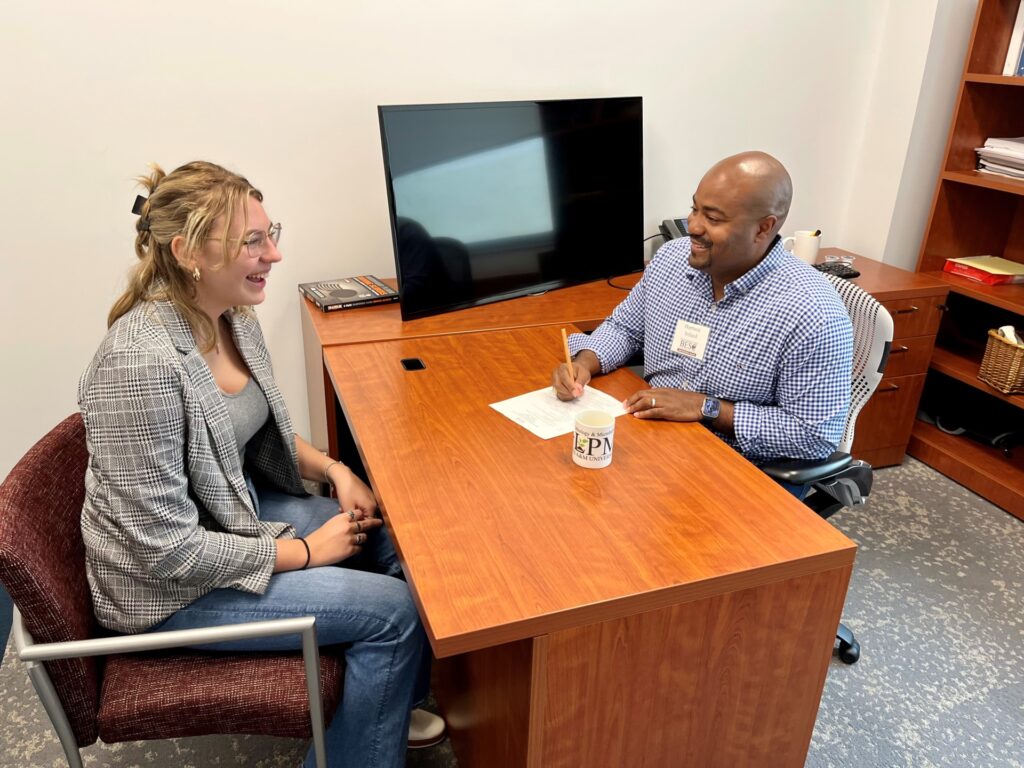Industry partners and former students prepare bioenvironmental sciences graduates to positively impact the environment
Professional board advises faculty, mentors students
The Texas A&M Department of Plant Pathology and Microbiology, PLPM, is preparing its bioenvironmental sciences students to make positive impacts in their careers by connecting them with inspiring environmental industry professionals.

Bioenvironmental sciences, BESC, is an undergraduate STEM program within the department. To help students succeed in this field, the department has created the BESC Professional Board, which partners with faculty and students to ensure BESC graduates are the best-prepared candidates for environmentally focused careers.
“The students who study in the BESC program have chosen to enter a rapidly growing field filled with our former students,” said Kati Stoddard, Ph.D., instructional associate professor and associate department head for undergraduate programs in the PLPM department. “We strive to not only provide our students with the best education, but to connect them within the industry so they are ready to make a positive impact on the environment and pursue promising careers when they graduate.”
Varied career options in industry, the private sector and government are available for BESC graduates. These options include bioremediation, energy production, waste management, applied biotechnology, environmental consulting, public health, regulatory and environmental compliance work, professional and graduate school, and environmental policy and law.
Engaged industry partners create opportunities for experiential learning and mentoring
The BESC Professional Board comprises 26 established environmental professionals who help connect students and industry. Many board members are former students who help program faculty ensure the curriculum aligns with the knowledge and skills students need for their careers.
For example, the board members help faculty develop case studies and teaching resources that give the students experiences directly related to work in their discipline. In one instance, the board helped Stoddard develop a case study on water sampling and provided redacted Phase I reports and environmental data for use in program courses. The board members also helped facilitate the installation of a groundwater demonstration well in the Leach Teaching Gardens so students could gain experience sampling groundwater.
Board members also raise funds for student internships and study abroad trips, conduct résumé workshops and mock interviews, mentor students, and help them find internships and jobs. The Professional Board also participates in the annual BESC Undergraduate Poster Symposium at Texas A&M and organizes several networking events each year to help students connect with former students and potential employers.

Board members know program graduates are some of the most prepared candidates entering environmental professions. As a result, Stoddard said she often receives emails from board members asking her to advertise job and internship opportunities to students.
John Sorkness ’11, an air quality specialist with AECOM, a Fortune 500 engineering and technical service company, serves as chair of the board’s Student Development and Mentoring Committee. He credits the wide variety of science-focused courses and mentoring he received as a student as keys to his career success.
“When I was trying to find a job during the recession in 2012, my technical experience, strong transcript and industry knowledge helped me get several job offers,” Sorkness said.
“The program was rigorous then and is even stronger today — I’ve never heard of BESC students struggling to find a job after graduation,” he said. “Also, it’s rewarding to see so many BESC students in the workforce, knowing that we are impacting the environmental industry.”
Industry benefits from graduates with science-based background and technical experience
Cristi Gomez ’00 ’02, also a graduate of the BESC program, is now senior director of regulatory safety and research and development compliance at Mary Kay Inc. She is responsible for product regulatory compliance as well as product safety and toxicology, including both human health and environmental toxicology.
Like other former students in the industry, Gomez has continued to help the BESC program and its students by speaking at meetings of the Texas A&M student chapter of the National Association of Environmental Professionals, NAEP. The chapter is housed in the PLPM department. NAEP, a professional organization of public and private sector environmental professionals, helps students learn from leaders in the environmental field, gain a better understanding of career opportunities and make industry contacts before they graduate.
“I’ve hired BESC graduates in environmental, health and safety roles where they were responsible for our manufacturing site programs,” Gomez said. “I knew I was hiring someone with a broad applied science background with exposure to different things in their major beyond just a chemistry or a lab-based degree. And, I’ve also had BESC students as interns.”
One of those interns, Lauren Waters ’20, completed her BESC degree and became a food and product safety scientist for Mary Kay Inc. In addition, her responsibilities include ingredient review, product safety, sustainability and data management. She also manages nutritional data and cosmetic regulation for markets in Canada, China, Malaysia and Mexico.
Because she spent two summers as an intern at Mary Kay Inc. and had a broad science background, Waters was hired for a position typically for someone with a couple of years of experience, Gomez said.
In the BESC program, Waters took a wide range of classes that covered different but related topics such as environmental regulation, water sampling, biofuels and soil science. The project-based classes improved her leadership ability, she said, and prepared her to work on collaborative teams with people from different backgrounds. As she gained more expertise in environmental science, her science-based background allowed Waters to explore and prepare for several career options that interested her.
“The versatility of the degree plan adapts to so many fields,” Waters said. “I went to college thinking I was going to medical school. BESC covers the prerequisites for medical school acceptance and allows flexibility for some GPA-boosting classes. A year later, I wanted to go to law school, and it allows the prerequisites for that as well. That adaptability prepared me for what I do now.”
Versatile bioenvironmental sciences curriculum targets wide range of career opportunities
Sorkness said the curriculum helps students “hit the ground running.” Students gain science-based knowledge and hands-on technical experience in courses that translate into their careers.
“The environmental field is a lot like the medical field,” Sorkness said. “It’s very broad with a lot of specialties you can go into. If you know what specialty you want to pursue, choosing the courses that relate to that specialty is the best way to prepare for it.”
To learn more about bioenvironmental sciences in the Department of Plant Pathology and Microbiology, visit https://environmental.tamu.edu.


